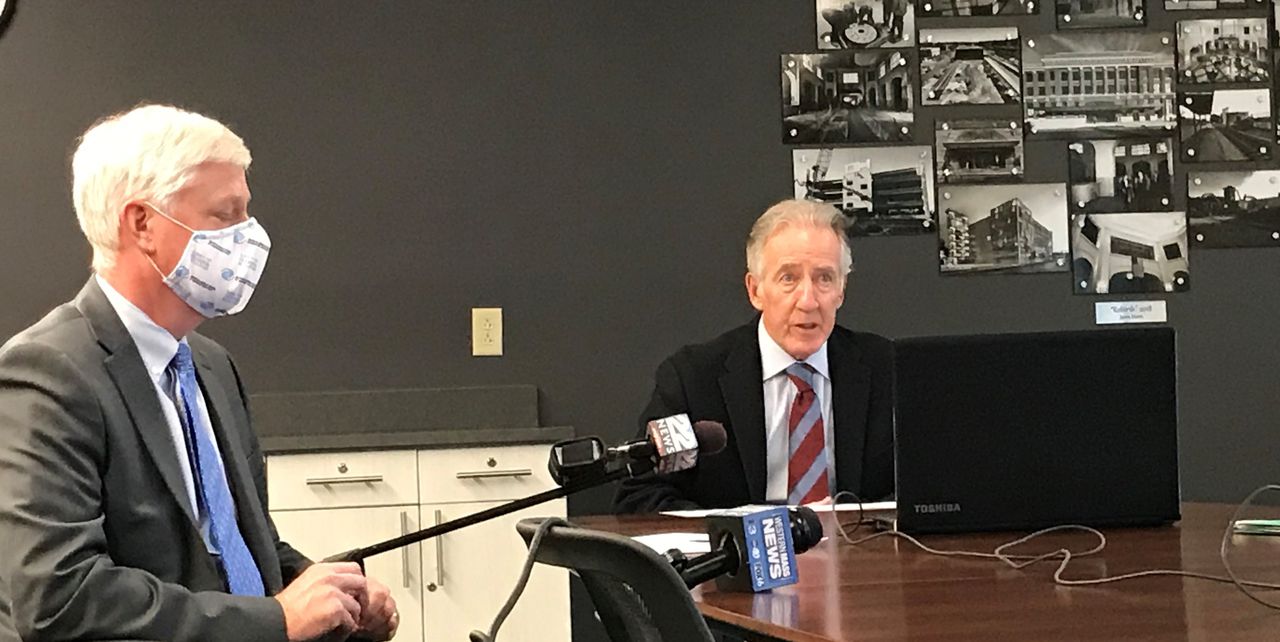Tag Archive for: awaits
Cyber threats abound as Springfield awaits center to fight them
/in Computer Security
SPRINGFIELD — Cybercriminals have latched onto confusion surrounding COVID-19 in their efforts to gain access to secure computer systems.
“They might say, ‘You have a signed check waiting,’” Stephanie Helm, director of the MassCyberCenter, said on a call with local officials Monday. “Or they might say, ‘COVID vaccines are available.’ Anything to get your attention.”
Cybercriminals are also infiltrating Zoom software and other remote conferencing programs.
“It could be for money, as a ransom,” Helm said. “Or it could be just to make sure things don’t work. It might be people who just want to disrupt.”
Monday’s event — coinciding with National Cybersecurity Awareness Month and Massachusetts Cybersecurity Month — served as a preview for CyberPlus New England, a facility at Union Station operated in conjunction with Bay Path University.
The Springfield Redevelopment Authority, which manages the station, received $1 million for CyberPlus from the state’s IT Bond Bill passed this summer. State Rep. Angelo J. Puppolo Jr., D-Springfield, sponsored the measure on the city’s behalf.
CyberPlus New England will be a training program with at least two 20-student classrooms and all the modern technology, said Paul Stelzer, president of Appleton Corp., which manages operations at Union Station. Once the money is actually available, the center could be up and running in nine months.
CyberPlus will be on the second floor of the station, in renovated office space. It will be open to educators, employers and others.
U.S. Rep. Richard E. Neal, D-Springfield, was on hand to talk about the federal role and to catch up on progress.
He wrote much of the CARES Act in his role as chairman of the House Ways and Means Committee, and noted Monday that it has money to help enhance cybersecurity for state-run unemployment systems.
Training in-demand cybersecurity professionals and making them available to growing companies is a business opportunity, said Western Massachusetts Economic Development Council President and CEO Richard K. Sullivan Jr.
Neal asked about the security concerns surrounding the state’s military bases, including Westover Air Reserve Base in Chicopee and Barnes…
A Seamless Journey Awaits You On The Outbound Flights: All You Have To Give Up Is Your Face
/in Internet SecurityThe DHS’s airport panopticon is rolling out slowly, but surely. And of course it’s being done with as little oversight or guidance as possible. Major international airports are already turning your face into your ID, giving travelers little option but to get their faces out if they don’t want to receive extra questioning.
If you’re worried about adding your face to the government’s extra-large bin o’ biometrics, you’re welcome to opt out. The easiest way to avoid this is to not travel at all, which is exactly what the DHS suggests. There are other options, but by the time you know they’re available, you’ve likely already had your face scanned and matched against the DHS database by software known mostly for its failure rate.
This happened to a JetBlue flier who noticed her face had been scanned and matched against… something… before she was able to board her international flight. She reached out to JetBlue via Twitter and got some not-very-enlightening answers and a couple of disturbing clarifications.
I just boarded an international @JetBlue flight. Instead of scanning my boarding pass or handing over my passport, I looked into a camera before being allowed down the jet bridge. Did facial recognition replace boarding passes, unbeknownst to me? Did I consent to this?
JetBlue responded to Mackenzie Fegan with the sort of apology one offers on Twitter: I’m sorry this made you feel [x]. The option no one at JetBlue will point out to you remains an option.
You’re able to opt out of this procedure, MacKenzie. Sorry if this made you feel uncomfortable.
Note that it’s “this” and not “we.” This is how a corporate entity absolves itself of responsibility while nominally offering an apology. Good stuff.
Fegan’s follow-up question was more on point:
Presumably these facial recognition scanners are matching my image to something in order to verify my identity. How does @JetBlue know what I look like?
JetBlue’s response was not very comforting:
The information is provided by the United States Department of Homeland Security from existing holdings.
Oh. “Exisiting holdings.” Awesome. But where did this “existing holding” get its backstock of facial photos? Well, some may have come from passports. Some likely came from state driver’s license databases. The DHS has a number of sources for people’s photos: mugshots, government employee records, biometric info collected from various state and federal agencies charged with vetting volunteers and applicants for certain forms of employment (day care, elder care, any job the government feels you need a license to perform…), and any place else the government may have acquired a photo of you (or someone who somewhat resembles you).
The process works nearly instantaneously. It’s seamless and slick and all the work is done behind the scenes. Just smile and move forward. Sure, you can opt out — or so JetBlue says — but the link JetBlue provided explains nothing but its fervent belief that more facial recognition databases can only be a boon for airline passengers.
Since the program’s launch in 2017, more than 50,000 customers have participated in biometric boarding on 500+ flights across all four cities. There is no pre-registration required. Customers can simply step up to the camera for a photo match and make their way onto the aircraft.
“The success of JetBlue’s biometric boarding program is a testament to the airline’s ongoing work to create a personal, helpful and simple experience,” said Ian Deason, senior vice president of customer experience, JetBlue. “The boarding touchpoint is an area that needs innovation and we feel biometrics will change the future of air travel as we look to create a more seamless journey throughout the airport.”
Opting in is as simple as putting your face in front of the cameras the DHS and JetBlue nudge travelers toward. Opting out, however, doesn’t appear to be a process anyone — the DHS or JetBlue — are willing to talk about openly. The DHS just says, “Don’t fly.” JetBlue says, “Why would anyone want to make their ‘journey’ less ‘seamless?'”
Flying has always been something the government has taken great interest in. The pitch is passenger safety, but the more the government knows about where and when you travel, the more secure it feels. It doesn’t do much for the security of passengers but it eases the government’s mind when its freely-moving citizens can still be tracked. Grabbing faces at checkpoints to ensure “seamless journeys” is just another step down the path the government’s been traveling for awhile now, which includes allowing the CBP and DEA to warrantlessly peruse traveler data to find people it wants to track… or to shake down for cash.
The tech is finally catching up with the government’s post-9/11 desires. It has asked repeatedly for us to trade privacy and personal security for a nebulous greater good. And it’s gone ahead and made those tradeoffs no matter what the answer has been.
Permalink | Comments | Email This Story
Techdirt.
Kaspersky: ‘A very bad incident’ awaits critical infrastructure
/in Mobile SecurityCyber-terrorism attacks against power grids, water supply systems, chemical plants and other critical infrastructure loom as a threat that could become harsh reality before slow-moving agencies act to secure them better, says the head of Kaspersky Lab.
Organizations that run these facilities using supervisory control and data acquisition (SCADA) gear are still gathering data about threats and aren’t close to implementing new defenses to counter them, says Eugene Kaspersky, founder and CEO of the company.

Eugene Kaspersky
To read this article in full or to leave a comment, please click here
